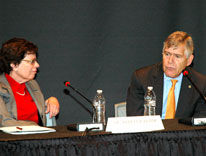
By Chris Casey | University Communications
AURORA, Colo. - The University of Colorado Denver | Anschutz Medical Campus, with its strong track record in research and technology transfer, is poised to partner with the job-growth engine that will be the new U.S. Patent Office in Denver.
That was the message of a U.S. Department of Commerce Innovation Panel this morning at the Anschutz Medical Campus. The panel discussion follows last week's announcement at the Anschutz campus that Denver was chosen as site for a satellite patent office. President Obama in September 2011 signed the America Invents Act, which mandated the creation of four satellite patent offices to reduce the backlog of patents waiting for approval at the U.S. Patent and Trademark Office in Alexandria, Va. The other cities selected are Dallas, Detroit and San Jose, Calif.
Scenes from the Innovation Panel:
|
"You're not going to have to come looking for us. I promise you we'll be beating down your door," University of Colorado Denver | Anschutz Medical Campus Chancellor Don Elliman told the federal officials. He said the university "would love to be a partner" in the arrival of a satellite U.S. Patent and Trademark Office in Denver.
Besides Elliman, the panel included Acting U.S. Commerce Secretary Rebecca Blank, Under Secretary of Commerce for Intellectual Property and Director of the U.S. Patent and Trademark Office David Kappos, Denver Mayor Michael Hancock and local private-sector entrepreneurs Robb Walt (Community Power Corp.) and Ali Ansary (SeventyK).
Lilly Marks, vice president for health affairs and executive vice chancellor Anschutz Medical Campus, introduced the panelists before an audience of about 50 in the Trivisible Room.
Marks said the campus was a fitting host for the innovation panel, as faculty and researchers in the University of Colorado System in the past five years have generated more than 1,200 invention disclosures, more than 1,000 patent applications and more than 50 start-up companies. Last year at the Anschutz Medical Campus, university faculty produced 127 invention disclosures and filed 123 patents.
"We rank as one of the nation's top-tier research institutions in the biomedical and life sciences," Marks said. "...We must speed the translation of basic research from the research bench to the bedside, and from the research bench to the marketplace. The patent office's location in our midst offers important recognition of the role the Denver region will play in our country's future."
Hancock, a CU Denver alumnus, said Denver is becoming an epicenter for job creation and the $440 million patent office, scheduled to open in 2014, is a "monumental leap" in the region's economic development. "We're excited about facilities like this Anschutz campus where we are today and what it means to our region," Hancock said. "It is huge for what is happening in the biosciences and research fields and around medical advances. ... We are leveraging our assets, growing our sectors and delivering strong, stable jobs to the region."
The patent office will strengthen the region's innovation by giving entrepreneurs and researchers convenient access to patent examiners, Kappos said.
"We need to collectively ask ourselves about how we can partner here with the university, partner with the university's labs, facilitate tech transfer and facilitate innovation outcomes more expeditiously and more efficiently," Kappos said. "... Simply put, this town is mission critical to supporting an economy that's built to last."
Blank emphasized that industries relying on intellectual property support about 40 million jobs, about one-third of the nation's gross domestic product. The jobs pay about 42 percent more than jobs in other industries, she said, so more patents mean more good jobs.
"The Commerce Department is helping to lead a commercialization effort with over 200 universities, including the University of Colorado ...," Blank said. "We need to help pull more of their discoveries into the marketplace. We need to ensure that more bright young people at places like this have the opportunity to enter and succeed in math and other science, technology, engineering and math-related fields, so-called STEM fields of education."
Elliman said a "seismic shift" is occurring within the university community at large and at the University of Colorado specifically. Previously, universities didn't focus too much on the commercialization of intellectual property, but that's changing, Elliman said. "We want to be a leader in that change. Frankly, the decision that you made to put a patent office here is an enormous assistance to us in helping to move that needle."
Pushing the forefront of knowledge has always been a core mission, but now the university realizes "we need to work on the translation of that knowledge, and we have a role to play with our partners in the private sector and our partners in the government sector," Elliman said.
(Photo: Acting U.S. Commerce Secretary Rebecca Blank listens as University of Colorado Denver | Anschutz Medical Campus Chancellor Don Elliman makes a point during the Innovation Panel discussion.)
Contact: Christopher.Casey@ucdenver.edu
